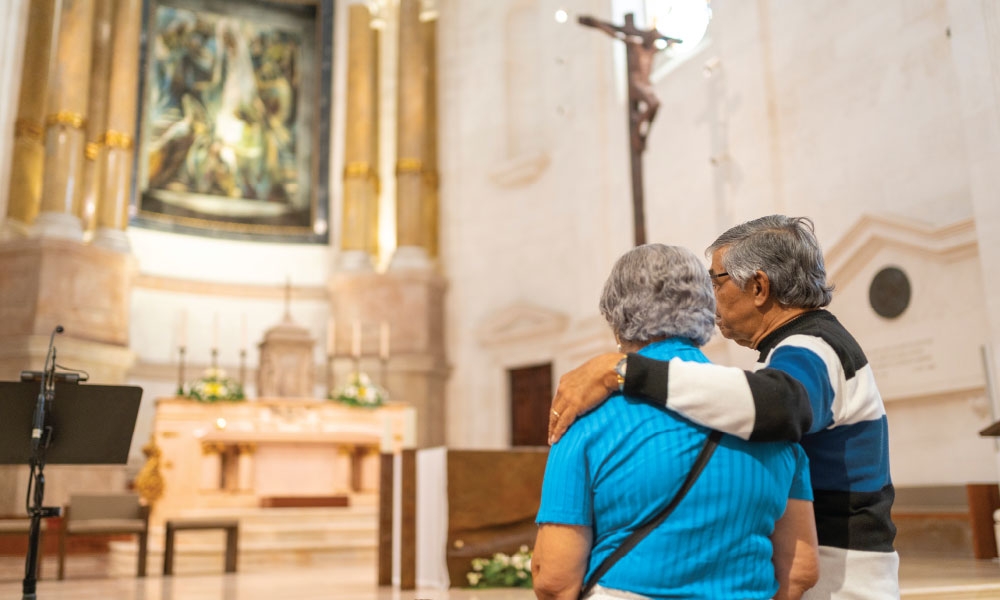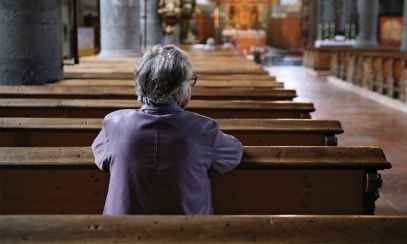
What can I do for my kids who don’t practice the faith?
I am a parent of three kids, all of whom I tried to raise in the Catholic faith. One of them seems to have a very little interest, one is relatively hostile and one still goes to church. None of them lives with us anymore, but I wish I could do something to strengthen their faith. Is there anything I can do?
I am a parent of three kids, all of whom I tried to raise in the Catholic faith. One of them seems to have a very little interest, one is relatively hostile and one still goes to church. None of them lives with us anymore, but I wish I could do something to strengthen their faith. Is there anything I can do?
Thank you for this question. I regularly speak with parents who are in a similar predicament. You and your spouse have done your best to pass on the faith to your kids. Oftentimes, when our kids do not embrace the faith, not only do we ask the question, “What did I do wrong?” but we also ask the question, “What can I do now?”
That is the question for which I would like to offer some points to consider.
There are still three very powerful things that parents can do to help their kids with the faith, regardless of whether they are still at home.
First, there is almost nothing more powerful than the witness of an authentic Catholic life.
As you know, one of the things that turns people away from faith more than almost any other is hypocrisy or inconsistency. When our actions do not match up with our words, people will more quickly believe our actions than they will believe what we say. One of the most powerful testimonies anyone can offer to another person is the witness of an authentic life — the kind of life people around us can observe and say, “Wow, they really believe what they say they believe.”
Now, that being said, you do not have to be perfect. That is impossible. Sometimes the witness of our own limitations and weaknesses can point to the truth and the grace found in Christ.
For example, I once spoke with a parent who expressed frustration over the fact that she would continually tell her kids not to yell at each other only to lose her temper with her kids and yell at them. She shared how she disliked being such a hypocrite in this regard. Her observation makes sense, but I wanted to remind her that if her kids saw her sin, then they should also see her ask for forgiveness.
Consider this: What if you were a perfect parent and perfect disciple of Jesus? Once your kids get to a certain age where they realize that they are not perfect disciples and they are not perfect parents, they might get to the place where they abandon the faith because “my mom or dad could live this, but that’s only because they were better than me,” and they might disqualify themselves. But if you demonstrate that you not only know how to do your best to follow the Lord but also know how to ask for forgiveness when you fail, that is a great testimony to authentic discipleship.
Second, we can never underestimate the power of a parental blessing.
In the Old Testament, fathers of a family were considered to be the priests of that family. They would be the ones who were able to offer the sacrifice and extend a blessing to the rest of their family. In the new covenant, we all have been made into what you might call “kingdom priests.” Because of that, a parent has the right, the ability and even the duty to bless their children. While both moms and dads can bless their kids, the father’s blessing is exceptionally powerful. If you are the father of any child (biologically, through adoption, or spiritually) your blessing over them has a unique value.
I always like to encourage fathers to actually extend their hands over their children and trace the sign of the cross on their foreheads. This might be weird at first, but it actually means something and actually does something. A parent’s blessing can be very powerful.
Third, regardless of whether your kids remain at home or if they have moved on, moms and dads are commissioned to pray for their children.
And when I say “pray for their children,” I mean dedicated prayer of intercession. This goes beyond simply saying, “Oh, and also for my kids …” This is entering into the realm of prayer and fasting for the salvation of your kids. I know that my own mom would regularly bring all of us kids before the Lord in prayer every single day. I know that she also embraced fasting for us in some way, shape or form on a regular basis. She did this for those of us who practiced the faith regularly, and she did this for those of us who struggled to practice. Parents should pray for all of their children, even those who seem to be “doing OK.”
One last thought for those parents who might fall into the trap of self-condemnation. You may look back on how you raised your kids and accuse yourself of having failed. That might be true. In this life, it is possible to fail. It is possible to have done the wrong thing. But what if you had been a perfect parent? What if you had done nothing wrong but had raised them with the perfect ratio of love and discipline? What if you had raised them with the perfect image of God the Father? You know this: Even then, there is no guarantee they would embrace the love of God in their lives.
How do we know this? We know this because God is the perfect father. And God’s own children turn away from him, even though he is perfect and perfectly loves them. People turn away from the love of God. Why would we be surprised if our own children would turn away in the midst of our own imperfect witnessing to God’s love?
The grace you are praying that your own children experience? Let that same grace comfort your heart. That same love you want your kids to know and say yes to? Say yes to that love in your own life. If we are not willing to do that, nothing else we do will make a difference. The story is not over. There is still time to say yes.
Father Michael Schmitz is director of youth and young adult ministry for the Diocese of Duluth and chaplain of the Newman Center at the University of Minnesota Duluth.



